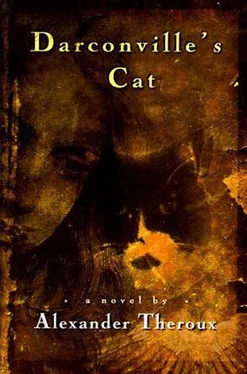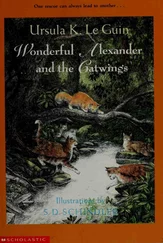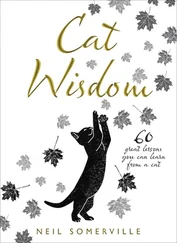Darconville paused, turned to the blackboard, and chalked out a wide rectangle. He wrote something and backed away for perspective.
—---------------
| This boxed sentence is false |
—---------------
“The paradox here is clear,” asserted Darconville, “is it not? If the sentence is true, then it is false; if false, then it is true.” Various eyes roved in troubled scrutiny over the board. “Do you see? A liar says that he lies: thus he lies and does not lie at the same time. The jeu de mots is fun grammatically,” warned Darconville with a smile, “but imagine how vulnerable would be your philosophical calm if this translated into the behavior of a human being? Careful,” said Darconville, “with your boyfriends.”
The girls tittered.
It was an academic matter, of course, and yet, incredibly, Darconville found himself thus preoccupied, searching to apprehend a figure in the distance, an interval so wide, for a thousand reasons, it dulled the edge of consequence but a distance nevertheless that also warned, by its very remoteness, that no real exchange of feelings was possible, a morbid underbreath, as if aloofness itself, whispering, told him to desist from that which he must inevitably be excluded. And yet how often, even from childhood, had this been the case in his life! And so he listened to what he thought, serving to clarify a matter at the heart of things and verify a falsehood. It formulated his final remarks.
“The artist,” concluded Darconville, going to the window and staring out at a group of hardy catalpas, “when a logical paradox to himself becomes, I suppose, the most unpoetical of men.” A cardinal went snip-snip-snip in the trees. “I don’t know, perhaps Keats had one glass of claret too many, loitered palely, and was overcome with the necessity of writing a line that could acknowledge two simultaneous but incompatible forces within him: poet and priest. He becomes a pomologist”—Ailsa Cragg looked frostily at Darconville and sucked a tooth—”trying to get fruit back to its paradisaical best. ‘Beauty is Truth, Truth Beauty’? It’s a concio ad clerum : a sermon to the clergy, wherein the poet is attempting to cheer himself up — in a fit of un-steadfastness, say? — and is at the same time begging us to accept not only what we should but also that which, poor poet, he more than sufficiently allowed us without special pleading. The poet’s own voice has interrupted him. He is awakened by his own snore. The line, which I disgressed to explain, is only a false bottom, collapsing an otherwise beautiful poem — and one which provides, perhaps, the best single commentary we have on the sonnet, ‘Bright Star.’“ Darconville was finished. “Are there any questions?”
There was silence.
“We’re clearer then,” asked Darconville, “on the meaning of the poem?”
“It hath to do with the thufferingth and thorrowth of life.”
Everybody groaned.
“I believe that young boy,” came a sudden voluptuous drawl from near the back of the room, a low magical level of loveliness which absorbed with a kind of absoluteness any rival utterance that might have been offered against it, “was just sayin’ the most obvious thing in the whole wide world.”
It was the kind of female voice that Juvenal somewhere naughtily describes as having fingers.
“He was talkin’“—she touched her tongue to her upper lip— “about love.”
Most of the girls, in icy silence, stared straight ahead.
“I’m sorry,” said Darconville who, although not taken in — he’d seen her back there at the beginning of class and almost with amusement had been waiting for her to speak — nevertheless feigned surprise, “but I can’t seem to find you here in my roll-book. You are a senior, aren’t you, Miss Poore?”
It was too much. Every head in the entire class — excepting one student’s, whose head was lowered — abruptly shifted from the teacher to her, the only student’s name he had known! And there she sat, confident and cool, wearing a nubby placket-front shirt trimmed in beige to match a black velvet dirndl.
Then, very slowly, Hypsipyle Poore lifted off her sunglasses and, with one lingering provocative glance, revealed eyes as limpid as the pools in Heshbon by the gate of Bathrabbim — and everyone there could have sworn she winked as with a cryptic smile she breathed softly, “Well, should I see you after class?”
“Love has been mentioned,” said Darconville, who saw he had a minute or two. “And suffering, as well. The history of romantic disappointment, I don’t doubt, often does nothing more than document the schism between Beauty and Truth or, better, proves that Beauty, when it becomes an end in itself, often yields no Truth. The simple line, in such cases, had no complexity within it — there can, of course, never be too much. A knowledge of many things is possible, it’s been said, but one can never know everything about one thing, though, sadly, one perhaps tries. The relationship with a boy or girl you spontaneously took for perfection-in-beauty but didn’t sequentially know by examination-in-truth can result in disaster. The implications of the Ideal? Who can really know? It is the chance one takes when one falls in love — the discussion of which,” smiled Darconville, “is perhaps beyond the province of the classroom here, agreed?”
The girls laughed — and prepared to leave. But Darconville, alert to the chance, quickly took up his class roll and began to call attendance.
“Muriel Ambler”
“ Here ”
“Melody Blume”
“ Here ”
The students, by turn, acknowledged their names. But for the suspense it might have been interminable, the list seemed so long. Here. Here. Here. But which was hers? Was it there?
“Sheila Mangelwurzel”
“ Here ”
“Christie McCarkle”
A carrot-top put up her hand.
“Glycera Pentlock”
“ Over here ”
“Isabel Rawsthorne”
A thunderclap! — then a flashing light across his book. Dazed, almost unconsciously, Darconville called out the remaining non-names, reflecting on this alone: only love makes the pain of lifting a shy head a grace. It equally unlocks a silent throat with the knowledge in the plaintive soul of what must be done, and so was, in the tender-taken breath he suddenly heard, soft as a swoon, say: “Present.”
And sculptured Aphrodite, in loose-flowing alb, stepping slow and fragile under the loops of dripping ring willows, puts a finger to her lips, shakes out tearshaped petals from her flasket, and then holds high her holy lights which silver and bewitch the common wood where two, long asleep, sweetly wake under the baldric of a new heaven to blush at the silence, pause, and faintly hear a goddess whisper in a voice lower than leaf-fall: “ Tomorrow shall be love for the loveless, and for the lover tomorrow shall be love .”
In short, Isabel Rawsthorne looked up and smiled.
Repetition is the essence of conjuration.
— St. NEOT OF AXHOLME
“ISABEL, Isabel, Isabel, Isabel, Isabel, Isabel, Isabel, Isabel, Isabel, Isabel, Isabel, Isabel, Isabel.” Darconville repeated the name into the unintelligibility we call sleep — and dreamt of desperadoes.
XII The Garden of Earthly Delights
There foamed rebellious Logic, gagged and bound,
There, stripped, fair Rhetoric languished on the ground.
— ALEXANDER POPE, The Dunciad
FACULTY MEETINGS are held whenever the need to show off is combined with the imperative of accomplishing nothing. It was the case at Quinsy College. There were five every year — a rump parliament of “educators,” all bunged up with complaints and full of prefabricated particulars, who sat around on their buns for several hours trying to correct various problems, whether of school business or personal bagwash, and to confront problematical variables, every one of which was always greeted with a salvo of idle questions, nice distinctions, sophisms, obs and sols, and last-ditch stratagems. The presiding genius? Brizo, goddess of sleep. The style? Extemporaneous. The participants? Teachers, who, like whetstones, would make others cut that could not cut themselves.
Читать дальше












